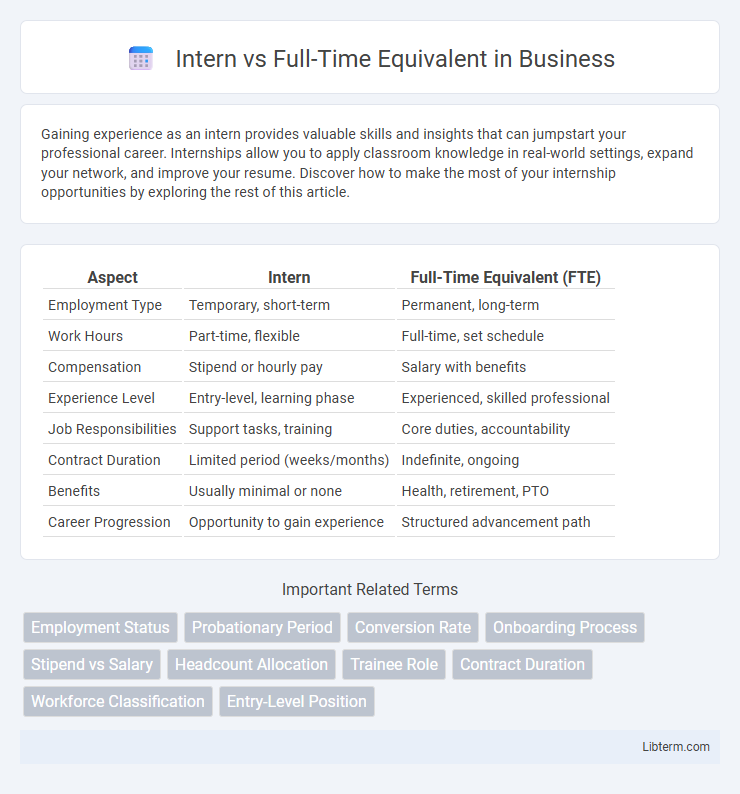Gaining experience as an intern provides valuable skills and insights that can jumpstart your professional career. Internships allow you to apply classroom knowledge in real-world settings, expand your network, and improve your resume. Discover how to make the most of your internship opportunities by exploring the rest of this article.
Table of Comparison
| Aspect | Intern | Full-Time Equivalent (FTE) |
|---|---|---|
| Employment Type | Temporary, short-term | Permanent, long-term |
| Work Hours | Part-time, flexible | Full-time, set schedule |
| Compensation | Stipend or hourly pay | Salary with benefits |
| Experience Level | Entry-level, learning phase | Experienced, skilled professional |
| Job Responsibilities | Support tasks, training | Core duties, accountability |
| Contract Duration | Limited period (weeks/months) | Indefinite, ongoing |
| Benefits | Usually minimal or none | Health, retirement, PTO |
| Career Progression | Opportunity to gain experience | Structured advancement path |
Understanding the Role: Intern vs Full-Time Equivalent
Intern roles primarily focus on gaining practical experience and developing skills within a limited timeframe, often involving project-based or learning-oriented tasks. In contrast, Full-Time Equivalent (FTE) positions carry long-term responsibilities, higher accountability, and a commitment to ongoing operational goals within an organization. Understanding the distinctions in scope, duration, and impact helps organizations allocate resources and set expectations accurately between interns and FTEs.
Key Differences in Job Responsibilities
Interns typically handle entry-level tasks such as data entry, research, and administrative support, designed to provide learning experiences rather than full ownership of projects. Full-Time Equivalents (FTEs) are responsible for comprehensive job duties, including strategic decision-making, project management, and delivering measurable outcomes aligned with organizational goals. The scope of responsibilities for FTEs demands higher accountability and expertise compared to the more supportive and developmental roles assigned to interns.
Recruitment and Onboarding Processes
Recruitment and onboarding processes differ significantly between interns and full-time equivalents (FTEs) due to varying commitment levels and role expectations. Intern recruitment often targets short-term skill development and project-specific roles, emphasizing quick integration and flexible training modules, whereas FTE hiring focuses on long-term fit, comprehensive background checks, and detailed role alignment. Onboarding for interns prioritizes rapid acclimatization and mentorship to maximize learning, while full-time employees undergo extensive orientation and systematic knowledge transfer aligned with organizational growth strategies.
Compensation Structures and Benefits
Intern compensation structures typically involve hourly wages or stipends, reflecting short-term engagement with limited benefits, while Full-Time Equivalent (FTE) positions offer salaried pay with comprehensive benefits packages, including health insurance, retirement plans, and paid leave. Interns often receive compensation aligned with educational credits or experience-building opportunities, whereas FTE employees benefit from structured salary scales based on role, experience, and performance metrics. The disparity in benefits underscores organizational investment in long-term employment for FTEs compared to the temporary nature of internships.
Training, Learning, and Professional Development
Interns receive targeted training focused on foundational skills and industry-specific knowledge, enhancing their learning through hands-on projects and mentorship opportunities. Full-time equivalents benefit from ongoing professional development programs designed to deepen expertise, promote leadership growth, and support long-term career advancement. Structured learning paths for both roles emphasize skill acquisition, with interns gaining practical exposure and full-time employees engaging in continuous education tailored to organizational goals.
Performance Expectations and Evaluation
Interns typically have performance expectations centered around learning objectives, skill development, and task completion under supervision, while full-time equivalents (FTEs) are expected to deliver consistent, high-quality work independently and contribute to long-term business goals. Evaluation of interns often involves feedback on growth potential and adaptability, whereas FTE evaluations focus on productivity, efficiency, and achievement of key performance indicators (KPIs). Companies use structured performance reviews to align each role's expectations with organizational standards and future career pathways.
Duration and Contractual Terms
Internships typically have fixed, short-term durations ranging from a few weeks to several months, often aligned with academic semesters, while Full-Time Equivalent (FTE) positions represent ongoing employment with no predetermined end date. Contractual terms for interns usually involve limited benefits and stipends under specific learning objectives, whereas FTE roles include comprehensive employment agreements covering salary, benefits, job security, and legal obligations. The transient nature of internships contrasts with the permanence and stability inherent in FTE contracts, influencing workforce planning and resource allocation.
Legal and Compliance Considerations
Employers must comply with labor laws such as the Fair Labor Standards Act (FLSA) when distinguishing interns from full-time equivalents (FTEs), ensuring unpaid internships meet strict criteria to avoid wage violations. Misclassifying interns as FTEs can lead to legal risks including back pay claims, penalties, and regulatory scrutiny from agencies like the Department of Labor. Proper documentation, clear role definitions, and adherence to Equal Employment Opportunity (EEO) regulations are essential to maintain compliance and mitigate liability.
Career Growth and Advancement Opportunities
Intern roles offer foundational experience but often lack the structured career growth pathways associated with full-time equivalent positions, which provide clearer promotion tracks and professional development resources. Full-time equivalents benefit from consistent mentorship, performance reviews, and access to advanced projects that accelerate skill enhancement and leadership opportunities. Employers typically prioritize full-time employees for training programs and internal mobility, making these positions more advantageous for long-term career advancement.
Impact on Organizational Culture and Productivity
Interns often bring fresh perspectives and enthusiasm that can invigorate organizational culture, fostering innovation and engagement among permanent staff. Their temporary status may limit long-term productivity contributions but enables organizations to experiment with talent without full commitment. Full-Time Equivalents provide consistent output and institutional knowledge, crucial for sustaining productivity and reinforcing a stable, cohesive company culture over time.
Intern Infographic

 libterm.com
libterm.com